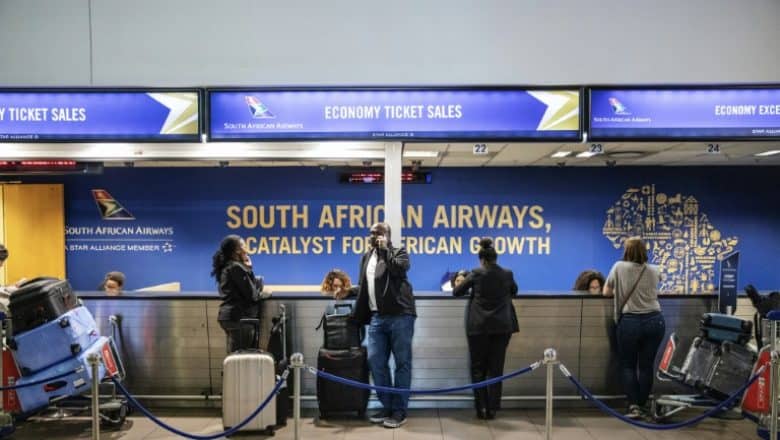Last updated on September 11th, 2021 at 03:11 pm
South African Airways was placed under a state-approved rescue plan on Thursday to avoid the embattled airline’s collapse following a costly week-long strike last month.
Thousands of South African Airways (SAA) staff walked out on November 15 after the flag carrier failed to meet a string of demands, including higher wages and job in-sourcing.
The strike was called off the following week after SAA management and unions eventually clinched a deal.
But the walkout dealt a severe blow to the debt-ridden airline, which has failed to make a profit since 2011 and survives on government bailouts.
“The Board of SAA has adopted a resolution to place the company into business rescue,” said a statement by South Africa’s Public Enterprises Minister Pravin Gordhan, adding that the decision was also supported by the government.
“It must be clear that this is not a bailout,” said Gordhan. “This is the provision of financial assistance in order to facilitate a radical restructure of the airline.”
The business rescue process will be directed by an independent practitioner. It is meant to prevent a “disorderly collapse of the airline”, he added.
Gordhan said the government would provide 2 billion rand ($136 million) to SAA in “a fiscally neutral manner”.
Existing lenders will also provide a 2 billion rand loan guaranteed by the government.
– ‘Financial challenges’ –
South Africa is struggling to get state-owned companies back on track after nine years of corruption and mismanagement under former president Jacob Zuma.
Its national airline — which employs more than 5,000 workers and is Africa’s second largest airline after Ethiopian Airlines — had been losing 52 million rand ($3.5 million) a day during the strike.
SAA’s board said the business rescue, scheduled to start immediately, was decided after consultations with shareholders and the public enterprises department “to find a solution to our company’s well-documented financial challenges”.
“The considered and unanimous conclusion has been to place the company into business rescue in order to create a better return for the company’s creditors and shareholders,” said the SAA board of directors in a statement.
The rescue plan will include a “new provisional timetable” and ensure “selected activities… continue operating successfully”.
With a fleet of more than 50 aircraft, SAA flies to over 35 domestic and international destinations.
“SAA understand that this decision presents many challenges and uncertainties for its staff,” said the board.
“The company will engage in targeted communication and support for all its employee groups at this difficult time.”
– ‘Lesser evil’ –
Unions told AFP they would comment later on Thursday.
They have agreed to a 5.9-percent wage increase backdated to April, but which would only start to be paid out next March depending on funding.
SAA had initially refused any pay rise.
The cash-strapped airline needs two billion rand ($136 million) to fund operations through the end of March. But it was unable to cover all of its staff salaries last month.
“Business rescue allows for the airline to continue to operate while it is being restructured, as opposed to liquidation,” analyst Daniel Silke told AFP.
He said the rescue was a “lesser evil for SAA” and would save more jobs than a “shutdown”.
But Silke still expected jobs to be cut as SAA attempted to reduce costs.
“Various divisions that make of SAA could be privatised,” he said. “There will be a review of SAA aircraft and routes covered by SAA.”
Unions had already demanded a three-year guarantee of job security following an announcement last month that almost 1,000 SAA employees could lose their jobs as part of another restructuring plan.
SAA pledged to defer that process to the end of January as part of the deal that ended the strike.

